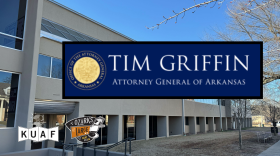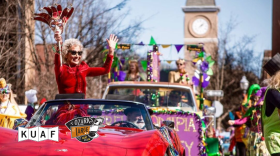Next on our show, we travel beyond the Ozarks to West Memphis, where Google has made a major investment. The tech giant recently confirmed it will build a $1 billion data center on more than 1,100 acres near the city.
To learn more about this project and how it might impact West Memphis, Ozarks at Large’s Jack Travis reached out to Mayor Marco McClendon. While no official timeline has surfaced, McClendon says progress has already been made toward the data center’s completion.
McClendon: I was told that the first building would be completed within six to nine months. I think they’re pretty much ready. During that same time, we’ve been working on a project called the South Loop Project, which is going to bring a road straight through that area that’s going to benefit them, to be able to get back and forth to the Google site as well. And that’s already in preparation right now.
Travis: Oh, wow. So work is—you know, they’re not actually out there, but everything’s in motion already.
McClendon: Yes it is. Yes it is.
Travis: So tell me about how this will impact West Memphis. Why and how did this get approved?
McClendon: Well, the council approved it, but let me just speak on how it’s going to benefit West Memphis. Actually, it’s going to benefit West Memphis because we’re going to have another major industry within our city that can invest in our community, listen to the needs of our community, and help support our community, whether it’s financially or through education and leadership. Google has shown that it’s a partner that’s willing to invest and not just talk.
They are going to make sure things are done, things that we are working on right now for the city that we have in the future. Building our first STEM center—that’s going to be so beneficial for the children of our city, but also help those youth for the future jobs that will be here, as well as the property tax money for the financial part that’s going to benefit the schools. It’s going to be several million dollars a year. That’s going to help take our school system to the next level.
So it’s definitely going to be good for our schools. But definitely, we have worked out a community development agreement that I can’t yet get into details about until after the first, but I’d love to come back on your show and tell. It’s going to be so beneficial for our city. It’s going to help provide quality of life, infrastructure and public safety.
And you know, right now everyone wants a community that’s going to be safe, crime free as well as infrastructure, because we’re on the Delta and right here by the Mississippi River. So we have dealt with some flooding, some water issues, different things like that and quality of life—just being able to go out and enjoy things with your family, parks and different things of that aspect. And it’s really going to benefit us with that.
And by owning our own utilities department, that’s the benefits that are going to come in. We have the second lowest utility rates in the state of Arkansas. And there are plans to come in and help us even lower those numbers so that the people of West Memphis benefit.
So this deal was not just good for Google, and it was not just good for the city of West Memphis, because yes, we got some benefit. But most importantly, it was good for the people of West Memphis. And I think they’re going to be proud of that and what we have been able to negotiate.
They didn’t have a big name like Google on hoping, wink wink, that we can start to go to Google and people in West Memphis, and you’ll think you’re going to heaven. Hopefully they’ll do the thing that’s going to help the benefit of our city that well.
Travis: So something I’m reading a lot as I research this project is Digital Delta. Could you talk about West Memphis’ place in the greater Digital Delta and how that whole greater Memphis area is really transforming to be more digital in their industry?
McClendon: Well, you know, definitely. First I want to say I’m very familiar with Digital Delta, but I’d like to introduce you to the Digital Delta West. I think we have a lot of opportunities. We’re being looked at and pursued by other data centers as well. And I think what West Memphis alone brings to the table is going to be amazing.
But to be in the Memphis metropolitan area where you have xAI right across the bridge, you have another xAI subcontractor in Mississippi. And I think with us landing Google and some additional possibilities coming in the near future, I think it’s definitely going to make our city more attractive.
It’s going to allow our young minds that normally would leave here to decide to say, hey, let me stay here in our area and help enjoy our area. A city is only as strong as the future or the residents that it has.
My son always joked with me about something. My son worked for Netflix and I said, son, when are you coming back home? And he told me, “Well, dad, no disrespect, I’m at home because he lives in L.A. When I’m coming there, I’m visiting.”
So hopefully these new industries coming here, they can say, well, hey, we’re working on quality of life, giving us something to do. When we all work, we can go to the park, we can go to a water park and we can go to movies, restaurants, whatever, as well as be able to enjoy things like our pump track, our Big River Crossing and different things like that. And then they can work here at places like Google or other data center or digital technology companies that are coming to our area.
So you’ve got to look at the ancillary jobs. With Google here, you’re going to have so many other jobs that are coming in that have to support that industry. It’s going to give many opportunities for our children to stay around here. And you know, you’ve got stronger children, you’re making a decent living. That allows us to do a whole lot more.
Travis: Has there been any environmental review? Because you always read about water consumption whenever you read about these big data centers. What’s happening with regard to that?
McClendon: Well, definitely. And I’m sure you all have heard much of the rhetoric that is going across the bridge with the xAI. But I can say with Google, you have zero gas turbines, so you have no problems with air quality. The air quality in the area will remain the same. It won’t affect it in any way. Or just say, making it better as well.
When you come down to the water, the water that they will be using is some that we call greywater, which is the water that goes through our treatment plant. What we’ve done is recycle our wastewater and then resell it back to Google to help cool their servers. So it won’t be any water that would be affecting the people of the city of West Memphis.
When it comes down to the utilities, the high voltage will be served by Entergy. The low voltage is going to be served by West Memphis Utilities, as well as we’re hoping that within the next five to 10 years, we’ll have some solar panels so pretty much the majority of that load would be dependent on solar. So that’s clean energy.
It won’t have any rolling blackouts or power issues.
Travis: It seems like it’s going to be quite revolutionary with its environmental impact and its power consumption, as opposed to a lot of these that already exist.
McClendon: Yeah. Data Centers in other areas have not got the best review. But I think Google has worked extremely hard as well as my team, my engineers. We wanted to make sure that we take care of our people that are in the city. Seeing everything that was going on this close to us across the bridge, we knew that we had to be innovative and do some new things and make sure that the problems others have—we learn from them and make sure that we don’t fall in that same trap.
I think we were able to dodge pretty much all of the learning curves.
Travis: So is Google attempting to engage the community as well? Or vice versa. How are they responding?
McClendon: Sure. We have had some meetings with individuals within our community, as well as Google actually has been here just recently. They have met with our Chamber of Commerce. They have met with our church pastors. They have met with key stakeholders in the community, and they are working hand in hand with this office.
Right now, we’re making sure that we deliver all of the information to the people. When you don’t have the air quality issues, water and utility issues, a lot of the fear is gone. More of the people want to know, what is Google doing for us? When you look and see they are helping us to invest within our kids, also going to help us expand our broadband internet throughout the city, helping with utility bills.
And they have not yet heard about the big benefits, the big bang for the buck, that’s going to come out on Oct. 2. I think everything pretty much is okay.
Travis: Well, I’d love to talk again post–Oct. 2. Maybe even once we get far enough down the road, I’d love to visit West Memphis.
McClendon: Well, you know, we got this thing called Why Not West Memphis? Why not? I ask everyone, where in America can you go within a five-mile radius and go to a Rogers sports complex? That’s our new sports complex with eight baseball turf fields, all turf fields, 16 pickleball courts, eight volleyball courts, basketball courts, sand volleyball courts, splash pad.
Go right down the street to Buc-ee’s coming to our community. So we have a 75,000-square-foot Buc-ee’s that’s coming to West Memphis that you’ll be able to enjoy, as well as the biggest tourist attraction in the Mid-South, Southland Casino.
And you have Ducks Unlimited Big River Crossing where you can ride 12 miles of paved biking trail, or you can walk it or just enjoy nature, or you can walk right across the bridge to Memphis and enjoy downtown Beale Street, as well as a Memphis Grizzlies game or Bass Pro Shops.
Travis: And then you have a revolutionary data center right on the horizon as well.
Also, we’re in the process right now of starting our Epic West Memphis, which is a football field, indoor water park, restaurants, hotels. The people of West Memphis approved the tax to build an aquatic center and a recreational center, as well as a new fire station, police station and stuff like that.
Travis: I’m sure that’s really bolstering morale. Just for you personally, to see that your town is behind you in all these changes.
McClendon: Well, you know, being born in West Memphis, graduating in West Memphis, raising children here in West Memphis, mom and dad still here in West Memphis. I’ve been serving this community over 22 years. It’s such an honor to be able to see West Memphis on the way and going the direction that it’s going in. Google is going to be a big success for us. And like I said, Oct. 2, I promise you, I’m going to be able to tell you a whole lot more. You’re going to be like, wow, is this real?
Yes. This is what they have confirmed that they’re going to do for our city. And we just have to keep building these big names, because when you’re able to give people economic opportunity, you don’t have to fish for them—they can become fishermen themselves. That can only help them. And what comes along with that? Instead of running home, they can stop by a home. Then they start making safer communities. A stronger city is only as strong as the people that are in it.
You can visit our partner Talk Business & Politics for a full report on the data center agreement. Google’s regional data center public affairs official, Laurel Brown, provided a statement to Ozarks at Large that says they are thrilled to confirm plans of the data center campus in West Memphis. They will cover the full energy costs for powering the facility, and they are working on ways to introduce alternative power solutions and variable load flexibility to reduce strain on the electric grid.
“We’re thrilled to confirm plans to build a data center campus in West Memphis, Arkansas,” Brown said. "In partnership with Entergy, our electricity utility provider, Google will cover the full energy costs associated with powering this facility. We are also working together to bring new solar energy and battery storage resources online, and to integrate innovative load flexibility into our power contract to reduce our usage during times when the grid is constrained. We look forward to engaging with the West Memphis community and will be sharing more details soon."
Ozarks at Large transcripts are created on a rush deadline. Copy editors utilize AI tools to review work. KUAF does not publish content created by AI. Please reach out to kuafinfo@uark.edu to report an issue. The audio version is the authoritative record of KUAF programming.








